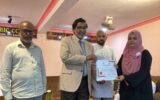

MOHAMMED RASOOLDEEN
COLOMBO : Minister of Foreign Affairs of Malaysia, Dato Seri (Dr.) Zambry Abdul Kadir found a little time to speak to Colombo Times on the strong bilateral relations between Sri Lanka and Malaysia.
The minister was on a three-day visit to Colombo to attend the IORA conference held in the Sri Lankan capital.
The minister was speaking to Colombo Times on the sidelines of luncheon hosted by Malaysian High Commissioner Badli Hisham Adam at his residence on Wednesday.October 11
Speaking about how the Madani Economy Framework aligns with Sri Lanka’s development goals, the minister explained that the Madani Economy Framework is fundamentally designed to foster inclusive, sustainable, and innovative growth. These core principles align closely with Sri Lanka’s own development goals, which also focus on social inclusion, economic sustainability, and technological advancement. The framework aims to create a society where opportunities are accessible to all, a vision that resonates with Sri Lanka’s own development agenda.
- The framework serves as a catalyst for mutual growth and cooperation between Malaysia and Sri Lanka. It offers avenues for collaboration in sectors such as renewable energy, digitalization, and healthcare, which are also priority areas for Sri Lanka. By focusing on these sectors, we can address some of the most pressing challenges facing both our nations, such as climate change and public health.
- Furthermore, by aligning our strategic goals through the Madani Economy Framework, Malaysia and Sri Lanka can work together to address challenges and seize opportunities. This alignment not only benefits our economies but also strengthens the social and cultural ties between our countries. It creates a platform for continuous dialogue and collaboration, making our partnership more resilient and adaptable to global changes.
Could you discuss specific sectors where the whole-of-government approach of the Madani Economy Framework could be most effective?
- The whole-of-government approach in the Madani Economy Framework extends beyond trade to sectors like cultural exchange, technology transfer, and educational collaboration. This multi-faceted approach allows for a more comprehensive partnership between Malaysia and Sri Lanka. It aims to create a more holistic relationship that goes beyond economic transactions.
- For instance, joint cultural festivals or technology incubators could be initiated to foster mutual understanding and skills transfer. Similarly, student exchange programs could be expanded to include not just universities but also vocational training centers. These initiatives can help build a skilled workforce that is adaptable and globally competitive, benefiting both nations.
- Moreover, by tapping into multiple sectors, we can build a relationship that is not just transactional but transformational. This approach aligns with the broader objectives of the Madani Economy Framework, which aims to create a society that is inclusive, sustainable, and innovative. It provides a blueprint for a partnership that is comprehensive, enduring, and mutually beneficial.

How does Malaysia’s commitment to geopolitical stability align with Sri Lanka’s foreign policy objectives?
- Malaysia is committed to maintaining a stable and peaceful international environment, a principle that aligns well with Sri Lanka’s foreign policy objectives. Both nations understand that geopolitical stability is a prerequisite for economic growth and development. This shared vision forms the basis of our diplomatic relations and collaborations.
- This shared vision allows us to navigate global challenges together, whether they are economic, environmental, or security-related. Our commitment to stability creates a secure backdrop for initiatives like the Madani Economy Framework to flourish. It allows us to focus on development goals without the distraction of geopolitical tensions.
- Furthermore, by working together on geopolitical issues, Malaysia and Sri Lanka can contribute to regional stability, thereby creating a more conducive environment for economic cooperation and cultural exchange. This collaborative approach enhances our ability to address global challenges and opportunities, making our partnership more robust and dynamic.
Could you identify some strategic industries in Malaysia that offer opportunities for Sri Lankan investors?
- Malaysia has several strategic industries that are ripe for investment, such as palm oil, digitalization, and renewable energy. These sectors not only offer lucrative opportunities but also align with Sri Lanka’s focus on sustainable development and technological advancement. The palm oil industry, for example, is a key sector where Sri Lankan investors could benefit from Malaysia’s extensive experience and technological advancements.
- Our well-developed infrastructure and strategic location make Malaysia an ideal partner for Sri Lanka in these sectors. For example, our advancements in renewable energy can offer valuable insights for Sri Lanka, which is also aiming to transition to cleaner energy sources. Our digitalization initiatives, particularly in the areas of e-commerce and fintech, could serve as models for Sri Lanka’s own digital transformation.
- Furthermore, by investing in these strategic industries, Sri Lankan investors can benefit from Malaysia’s competitive edge while contributing to mutual growth and cooperation between our two countries. It opens up avenues for technology transfer, skills development, and even joint ventures that can be mutually beneficial. This kind of bilateral investment strengthens not just our economies but also our diplomatic relations.
What are the planned outreach programs to engage the Malaysian diaspora in Sri Lanka?
- We are in the process of developing outreach programs that aim to engage the Malaysian diaspora in Sri Lanka. These programs will focus on business collaborations, cultural exchanges, and educational partnerships. The idea is to create a network that can facilitate the exchange of ideas, skills, and resources between Malaysia and Sri Lanka.
- The expertise and networks of the diaspora can serve as valuable bridges between our two countries. For instance, business seminars and networking events can be organized to connect Malaysian entrepreneurs in Sri Lanka with local business communities. These connections can lead to new business opportunities, partnerships, and even mentorship programs that can benefit both nations.
- Additionally, by actively involving the diaspora in these initiatives, we can tap into a valuable resource that can contribute to the mutual growth envisioned by the Madani Economy Framework. Their involvement can provide a unique perspective and set of skills that can enrich our bilateral relations in various sectors, from business to education and even in cultural exchanges.














